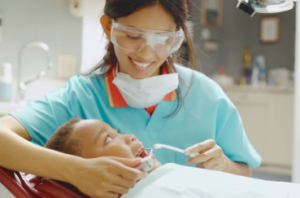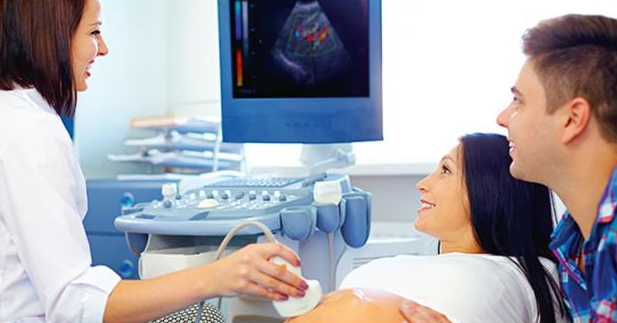Contact Us (562) 916-5055
17215 Studebaker Rd., Ste 310, Cerritos, CA 90703 | Mon - Fri 8am To 6pm
The diagnostic medical sonographer provides patient services using medical ultrasound (high–frequency sound waves that produce images of internal structures). Working under the supervision of a physician responsible for the use and interpretation of ultrasound procedures, the sonographer helps gather sonographic data to diagnose a variety of conditions and diseases, as well as monitor fetal development.
The program will prepare students in obstetric and gynecologic sonography (the female reproductive system), abdominal sonography (the liver, kidneys, gallbladder, spleen, and pancreas), and vascular technology. The program is designed to provide students with the skill and knowledge to obtain entry-level jobs as Medical Sonographer in a Hospital or clinical environment.
Although no State requires licensure in diagnostic medical sonography, organizations such as the American Registry of Diagnostic Medical Sonographers (ARDMS) certify the competency of sonographers through registration.
PCI College
17215 Studebaker Road, Suite 310
Cerritos, California 90703
562-916-5055


| The following upper division courses are taken as part of the B.A.S. Program: | |
|---|---|
| Course Number | Course Title |
| HS 301 | Patient Care |
| HS 302 | Pathophysiology |
| HS 303 | Healthcare System: Law and Ethics |
| HS 304 | Safety in Healthcare |
| HS 305 | Management Principles for Imaging Professionals |
| HS 306 | Marketing and Healthcare |
| HS 307 | Case Studies in Healthcare |
| DMS 301 | Advanced Sonography |
| ENG 301 | College English II |
| SOC 301 | Sociology |
| PHY 301 | Physics |
| HIS 301 | History of Health Sciences |
| The following courses are transferred from the A.A.S. Program: | |
|---|---|
| DMS 100 | Human Anatomy & Physiology I |
| DMS 125 | Human Anatomy & Physiology II |
| DMS 150 | Vascular Technology I |
| DMS 155 | Vascular Technology II |
| DMS 175 | Abdominal Sonography I |
| DMS 180 | Abdominal Sonography II |
| DMS 200 | Sonographic Physics and Instrumentation |
| DMS 225 | Echocardiogram |
| DMS 250 | Obstetrical and Gynecologic Sonography I |
| DMS 255 | Obstetrical and Gynecologic Sonography II |
| EXT 100 | Clinical Rotation Externship |
| COM 101 | Communications |
| PSY 101 | Psychology |
| MAT 101 | College Algebra |
| ENG 101 | College English I |
Students focus on learning how to create environments of care in their workplace.
This course provides scenarios that give the students an understanding of health care ethics, factors of how patients respond to change including chronic or terminal illness, and issues pertaining to sexuality and confidentiality. Students are introduced to multicultural perspectives and practice the recognition of patient attitudes, beliefs, and values while understanding family needs, roles, and responsibilities. The basic principles of psychology along with developmental stages of the lifecycle and cultural, hereditary, and environmental influences on behavior are covered in this module. Students will also discuss and define professionalism, ethics, the scope of practice, and legal implications of working in the healthcare field.
This course explores the principles of human physiology and pathologic processes that alter the human body’s lines of defense and resistance to disease. The course will provide the student with an understanding of structural adaptations and functional responses of cells, tissues, organs, and systems. The student will develop the ability to relate clinical manifestations of pathophysiologic changes as they apply to the imaging professional.
This course is an introduction to the laws and ethics of providing health care services. The course is intended to familiarize the student with state and federal health regulations.
Because ethics and laws are both dynamic, emphasis is placed on discussing some of the dramatic changes in health care delivery, such as managed care, patient self- determination, medical record keeping, and various laws that impact health care employment.
The goal of this course is to introduce the fundamentals of patient safety, evaluation of quality and quality measures and principals of quality improvement to students working in any aspect of health care or in health services research.
The course will be divided into these three overlapping topic areas and will consist of lectures, group activities and project work. We will survey important topic areas in patient safety.
We will explore the components of quality measures and their construction and evaluation in the current healthcare milieu. Students will review and create quality measures within their chosen field and develop a quality improvement project to improve a process or outcome.
This course explores the multiple dimensions of the role of the imaging professional in the healthcare arena. Emphasis is placed on the management responsibilities needed to foster and promote quality outcomes. Topics will focus on aspects of the following: patient engagement and communication, recruitment and retention, emotional intelligence, creating effective committees and teams, and coaching and mentoring skills.
This course is a study of the nature and function of marketing within the healthcare setting. Topics include strategic planning, competitive analysis, conservative behavior, marketing communication, and public relations.
This course explores the dynamics of the healthcare marketplace including changing demographics, increasing demands of the aging population, healthcare workforce, and new medical technology and research. Emphasis will be placed on health behaviors including smoking, poor dietary habits, lack of exercise, alcohol abuse, and workplace violence.
This course examines advanced sonographic specialties that include fetal echocardiography, pediatric echocardiography, breast ultrasound, neurosonography, or other approved evolving sonographic specialty areas.
The student will learn to identify normal anatomy, describe standard protocol, and demonstrate knowledge of disease and pathology associated with each specialty area.
Students will strengthen their own writing skills by developing a clear understanding of the writing process. Students will also learn how to become reliable critics and editors of their own work.
This course involves the study of contemporary sociological theories of organizational dynamics and behavior. It also serves as an analysis of the social structural and interactional dynamics of organizational settings, and includes supervised individual or group projects and reports.
The course contains a comprehensive study of measurement, density, and introduction to Newton’s laws’ of motion, gravity, conversations of energy, work, power, and momentum. The course additionally includes topics in heat and temperature, electricity, sound, and light. All topics studied include an emphasis on problem solving, dimensional analysis, and the application of mathematics in each topic area.
This course presents a general survey from 1800 to the present, with the primary focus on Europe and the US. Topics include: the rise of scientific medicine; the significance of germ theory; the development of medical therapeutics and technologies; the growth of health care institutions; the evolution and specialization of the medical profession.
The Bachelor in Applied Science (BAS) degree is awarded for completion of a comprehensive program of study in professional technical education designed to prepare graduates for technician level employment.
The purpose of this course is to teach the students skills to enable them to acquire positions leading to a substantial career.
The credential will be awarded upon completion of the proposed bachelor’s degree program.
The Bachelor of Applied Science (BAS) degree is awarded for completion of a comprehensive program of study in professional technical education designed to prepare graduates for technician-level employment.
The degree awarded to the student is the Bachelor of Applied Science (BAS) in Diagnostic Medical Sonography.
PCI College is accredited by the Accrediting Commission of Career Schools and Colleges. PCI College is licensed by the Bureau of Private Postsecondary Education (BPPE) , Sacramento, CA. https://www.bppe.ca.gov/
Financial aid is available for to students who qualify. We have flexible payment plans and show you how to apply for loans and grants.
After you graduate, we help you find a position in your career field! We have successfully helped our graduates to start careers with 100’s of local companies!